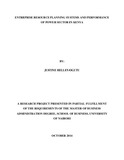| dc.description.abstract | Enterprise resource planning is a system that effectively integrates all information required by
the operation process. Power generation and distribution faces a lot of challenges. These
challenges are frequent power interruption caused by power outrage, low plant availability as a
results of poor maintenance practices and slow response to plant breakdown, poor and unreliable
distribution network, over dependence on hydro power which is subject to vagaries of whether
and high operational cost resulting from maintenance of aged plants, inflationary pressure and
high demand for social services. The purpose of the study was to establish the extent of ERP use
in power sector in Kenya and to find out factors influencing effectiveness of ERP use on
operational performance. It was also required to establish the impacts of ERP use on operational
performance.
The study adopted case study. Data was collected using closed ended questionnaire developed in
likert scale. The study took five months to complete and out of seventy questionnaires
distributed, only fifty five respondents returned their response. Data was analyzed using
descriptive statistics in line with objective of the study. The study found out that ERP system is
predominantly used in supply chain management, customer service, production and distribution.
Factors that influence effectiveness of ERP are top management support, training and education,
business process management, cultural and structural change, clear understanding of strategic
goal, data accuracy and focused performance measurement.
The study also indicated that ERP systems impacts positively in organization performance. Some
of the impacts on performance identified by the study are improved order management and
replenishment, improved customer responsiveness, improved customers interaction, increased
interaction across enterprises, improved suppliers interaction, improved on – time deliveries,
lower inventory level, cash management and reduced direct operation cost. It can therefore be
concluded that ERP can be used to transform operational capability and improve performance of
organization in the country. This system also addresses operational objectives like quality, cost,
flexibility and dependability. Therefore ERP proved to be a power house for real organizational
operation. It is appropriate to consolidate and integrate organizational operation. Organizations
should come up with policy direction to enhance ERP usage. | en_US |

